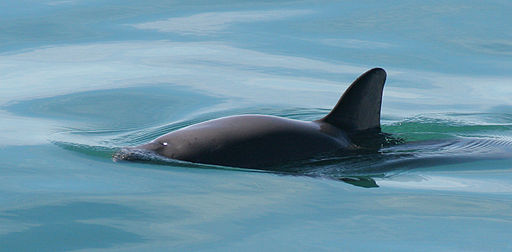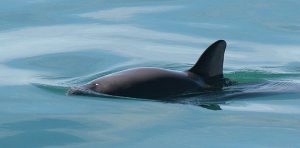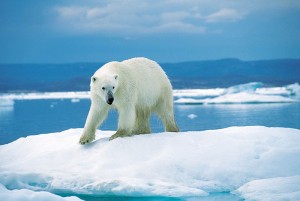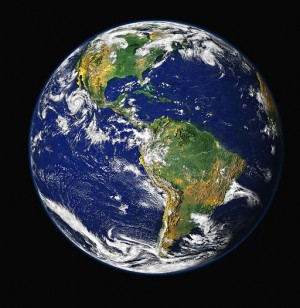Vaquita Rescue Gone Wrong
The most endangered marine mammal in the world, the vaquita, is facing an uncertain future as a rescue plan involving taking some animals into captivity has been abandoned after the death of a captured individual.
 Image: By Paula Olson, NOAA [Public domain], via Wikimedia Commons
Image: By Paula Olson, NOAA [Public domain], via Wikimedia Commons The vaquita porpoise is the world’s smallest porpoise and also has the dubious distinction of being the most endangered marine mammal in the world. For this reason it is known as the ‘panda of the sea’. The vaquita only lives in the upper Gulf of California and latest estimates by scientists who have been monitoring the species for decades show there are fewer than 30 vaquitas left in the wild. The cause of their downfall is fishing bycatch. Vaquita get tangled and drown in nets set illegally to catch another endangered species, a fish called the totoaba. The poachers catch them to get an organ called the swim bladder (considered a delicacy and status symbol in China) which can fetch £74,000 a kilo on the black market. It has been dubbed ‘aquatic cocaine’.
Totoaba fishing was banned in Mexico in 1993, but it was only when the number of vaquita dwindled to around 100 individuals in 2005 that the government also introduced a ban on most gill nets which trap the vaquitas, including those used for catching shrimp and other kinds of fish as well as totoaba. Fishermen are still allowed to use a different type of net, intended for catching corvina fish, because that net is not supposed to pose a threat to the vaquitas. But because the corvina and totoaba fishing seasons overlap, fishermen continue to use the totoaba nets by hiding them beneath the corvina nets on their boats.
In June of 2017, the ban on gillnet fishing was made permanent. The government also launched an extensive survey of the vaquita population using an approach that included both visual monitoring and advanced techniques that use sound to locate the animals. In total, the Mexican government has committed more than $100 million in an effort to protect the vaquita and support the local fishing community.
In October, the Mexican government requested a meeting of an international team of experts from Mexico, the United States, Denmark, the Netherlands, Canada, Hong Kong and the United Kingdom in San Felipe. They begun a bold, compassionate plan known as VaquitaCPR to save the endangered vaquita porpoise from extinction. The project, which had been recommended by the International Committee for the Recovery of the Vaquita (CIRVA), involved locating, rescuing and then temporarily relocating the vaquitas to an ocean sanctuary off the coast of San Felipe. The explicit goal of CPR was to return the vaquitas to their natural habitat once the primary threat to their survival has been eliminated.
Dr. Lorenzo Rojas-Bracho, lead vaquita expert and chair of CIRVA said at the time: “Rescuing these animals and placing them in a temporary sanctuary is necessary to protect them until their natural habitat can be made safe. We realise that capturing even a few vaquitas will be very difficult, but if we don’t try the vaquita will disappear from the planet forever.”
However, earlier this month it was clear that this would not work, as the rescue plan met with disaster and has now been abandoned. Last month, the $4m (£3m) rescue plan by a team of more than 60 scientists and divers ran into trouble after only a few days, when the first vaquita they caught, a calf, had to be released when it began to display dangerous signs of stress.
Experts had planned extensively for the scenario and every precaution was taken to safeguard the health of the vaquita calf, which was estimated to be about six months old. They returned the calf to the same spot in the Gulf of California where it was originally located and where other vaquitas were observed. Before releasing the animal, various tissue samples were taken which scientists will analyse and share with colleagues at other research institutions like the Frozen Zoo in San Diego, California which will conduct genetic sequencing.
Yet shortly after that, a second vaquita was caught but died a few hours after capture. The team then decided that catching any more animals presented too much risk to the species and further attempts were suspended.
Project scientist Barbara Taylor, of the US National Oceanic and Atmospheric Administration, said: “This is a very, very serious setback. Taking vaquitas into human care was always an extreme measure, but it was virtually our only option. Now even that has gone. The vaquita is now facing extinction unless illegal fishing can be curtailed. Saving the vaquita now rests with the Mexican government, which might somehow be able to end the illegal fishing for the totoaba. And that is a big ask. Otherwise, it is very unlikely that we are going to have vaquitas in a couple of years.”
“Our last hope was that we could capture enough vaquitas to start a captive breeding colony and restore numbers. We had no experience in capturing these animals and it now turns out they respond badly to being taken in nets and being kept in captivity. Really we should have acted a decade ago when we still had a few hundred vaquitas left and the loss of one or two would not have been so critical,” said another of the project’s scientist, Lorenzo Rojas-Bracho, of Mexico’s National Institute of Ecology and Climate Change.
The plight of the vaquita had gained increasing international attention after actor Leonardo DiCaprio, Mexican President Enrique Peña Nieto and Mexican billionaire Carlos Slim signed an agreement committing Mexico to save the vaquita, identifying specific conservation goals. But with the abandonment of the rescue plan, a serious blow has been dealt to the recovery of the vaquita, which now faces the immediate threat of extinction. In order to make the Gulf safe for the species in the future, experts agree it is important to prevent illegal fishing of the also-endangered totoaba fish and to support alternative economies for the fishing community. This will be the vaquita’s last hope.




No comments yet.